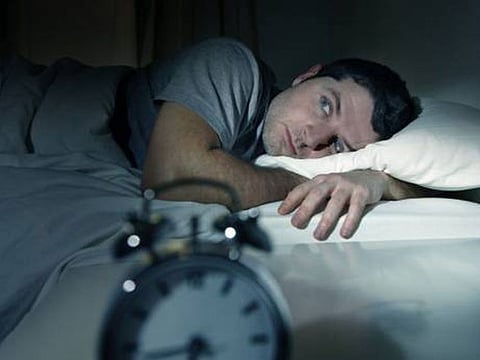You asked: Why do I wake up at 3am? We answered
We all know how difficult it is to stay asleep throughout the night

Lack of sleep is a serious concern among residents in the UAE with around 90 per cent of individuals suffering from sleep deprivation, showed research.
“Repeated sleep problems can be the body’s way of hinting at something more. Increased stress levels, mood swings, and anxiety are all ways your body might be trying to tell you it’s suffering from a sleep disorder,” said Dr Hady Jerdak an Internal Medicine, Pulmonary Diseases and Sleep Medicine at Medcare Hospital.
But then, we go to sleep and something wakes us up in the middle of the night. What is the cause of this?
Getting older
Dr. Fabrizio Facchini, a Consultant Pulmonologist at Valiant Clinic tackles the idea that age may have something to do with why our sleep efficiency decreases. “Research has been done on this subject; however there is no concrete explanation why this happens. As of now, waking up in the middle of the night is considered a natural progression of age. Another reason is that older people have certain medical conditions and take certain medications that can contribute to insomnia.”
Stress
Dr. Iman Abisourour, a Consultant Internal Medicine at Valiant has a clear diagnosis for those who cannot stay asleep for a certain period. This is called Sleep Maintenance Insomnia – a medial term to describe people who cannot maintain sleep. No one really knows the cause. Some factors include genetic issues, being under stress and not being able to plan your bedtime properly.
A hot room
Nothing is more disruptive to sleep than an overheated body. The ideal temperature to adjust your thermostat on is between 21 and 23 degrees Celsius. Wear light cotton pyjamas and make sure your bedroom is a cool and dark environment.
Chewing before bed
Dr. Facchini said that unhealthy eating habits could contribute to lack of sleep. If you consume a lot of caffeine or eat a heavy meal right before bedtime, it may cause you to be restless, because your body is busy digesting. It is recommended to eat 2 hours before bedtime. It also helps if you remove food from your bedroom and to not chew gum at night, since the movement of chewing anything before bed stimulates your brain and actually wakes you up in the middle of the night.
Napping during the day
Dr. Iman said that napping depends on each individual’s requirement. Some people’s bodies require sleeping time during the day, in which case they should take naps. However, these should be power naps around 20 minutes long, never more than one hour. Sleeping over an hour makes it hard to wake your body up. Some people do not require nap times and so they should not force their bodies to sleep during the day. This however should not affect nighttime sleep.
Looking at our phones
Blue light that is radiated from screens and TVs is known to be directly correlated to keeping people awake. Research shows that the light has the same power as a shot of coffee. It is recommended to keep all technology out of the room especially phones and TVs. It is better to read a book or use an e reader before bed.
Good quality sleep consists of 4-5 cycles of sleep where each cycle has 40 per cent superficial sleep, 40 per cent deep sleep and 20 per cent rapid eye movement phase or dream phase.
“We usually experience more deep sleep in the beginning of the night and more dreaming at the end of the night,” said Dr Jerdak.
Insomnia affects your health and day-to-day life. Side effects include losing focus or feeling sleepy throughout the day. If you suffer from insomnia, you should see a physician. There are different lines of treatment for insomnia including medication as well as cognitive behavioral therapy, which shows great results as a long run solution.



